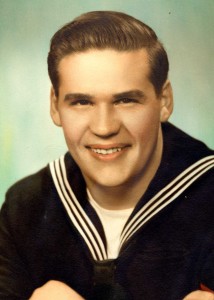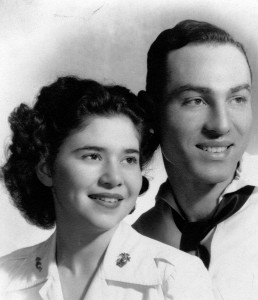Like my paternal grandparents, my maternal grandfather Ray, his older brother Art, his younger brother Bernie, and his in-law Chuck (whose daughter married Ray’s son) served in the military during World War II. Their respective children contributed their father’s photo in uniform and short bio to the Illinois Holocaust Museum and Education Center‘s exhibit on Jewish WWII soldiers.
Raymond Marcus
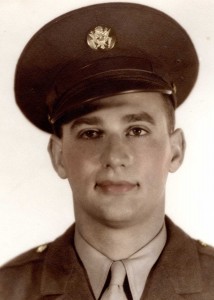
Raymond Marcus was inducted into the US Army in August 1942. He was 21 years old. Scoring high on mechanical aptitude tests, Ray was assigned to the 3476 Ordinance MAM Company, a unit comprised of auto and diesel mechanics, gun smiths, black smiths, and heavy equipment operators. On June 7, 1944, Ray drove an equipment-laden, 2 ½ ton GMC 6X6 (nicknamed “Ruthless” after his wife Ruth who he married two days before shipping out overseas), up onto Omaha Beach and ultimately across France, Belgium, Holland, and finally into Germany. At war’s end, Ray’s company was awarded the Distinguished Service Unit Citation for their gallantry in five major battles. Ray passed away in May 2010. He is survived by Ruth, his two children, five grandchildren, and (to date) two great-grandchildren.
Arthur Marcus
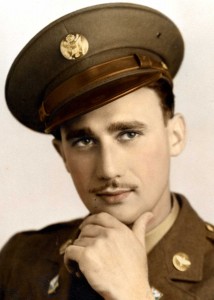
Arthur J. Marcus joined the Army Air Force in 1942 after the Japanese attacked Pearl Harbor. He had previously taken flying lessons as a hobby and was hoping to be trained as a combat pilot. While imperfect eyesight kept him from flying, his extensive knowledge of airplanes did qualify him to be trained as a flight engineer and airplane mechanic. Arthur attained the rank of Master Sergeant and was assigned to the China Burma India Theatre. He and his crew spent the war ferrying a diverse variety of airplanes between air bases in Asia and the Pacific Islands, supporting and supplying the advancing troops. He may not have reached his personal goal of becoming a combat pilot, but he took great pride in knowing he was a part of a noble effort.
Bernard Marcus
As a teenager, Bernie Marcus wanted to go off to war like his older brothers Art and Ray. He tried to enlist in the Marines when he was only 15 and a half years old, but they found out he was too young and sent him home. He finally was able to enter the Navy in June 1945 as the war was winding down.
In less than a year, Bernie rose to Petty Officer 3rd Class, serving as a clerk/typist. He spent much of his time typing discharge orders for thousands of grateful sailors.
Following his discharge from the Navy, Bernie joined thousands of GIs who were sent to college under the GI Bill. That same year, he married his high school sweetheart, (Harriet) Louise Moshel, and went to work for his father’s paintbrush business, the Marcus Brush Company. Bernie and Louise eventually had 4 children and left Chicago for California, purchasing a retail patio and garden business. He retired in 1990.
Louise has passed on, but Bernie still lives in California near his daughter. He is blessed with five grandchildren.
Charles Milner
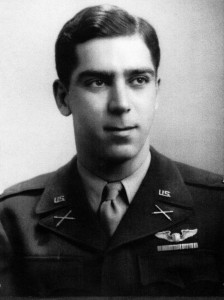
The opportunity to learn to fly led U.S. Army First Lieutenant Charles Milner to give up command of an artillery battery in coastal Alaska in 1944 and to volunteer for the very dangerous job of artillery spotter. First Chuck received flight training. Then he was taught to pilot an unarmed, canvas and balsa-constructed airplane low and slow over enemy lines, while radioing target coordinates to artillery units. Chuck was awaiting orders to go overseas when the war ended. Following his discharge from the Army, Chuck returned to Chicago, his hometown, and took up his career as a wholesale diamond jeweler and gemologist. Chuck passed away in 2001 at the age of 82. He is survived by his wife, two daughters, and four grandchildren.
- Stories about my maternal grandparents, Raymond Marcus and Ruth Feldman Marcus
- Interviews with Ruth Feldman Marcus, Barbara Marcus Felt, and a talk with Raymond Marcus
- Eulogies of Raymond Marcus
- An essay about Raymond Marcus, written by my then 14-year-old brother
- The 90th birthday of Ruth Feldman Marcus + Hanukkah celebrations
- Stories about my paternal grandparents, Justin and Eleanor Felt


